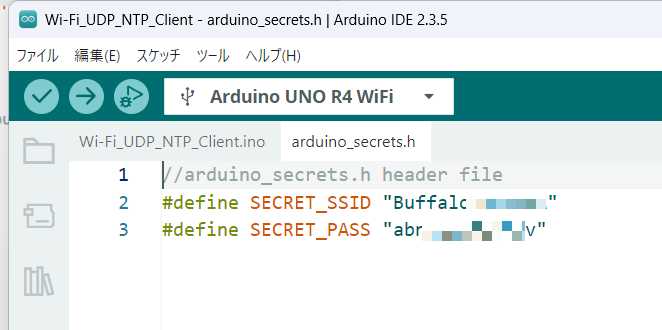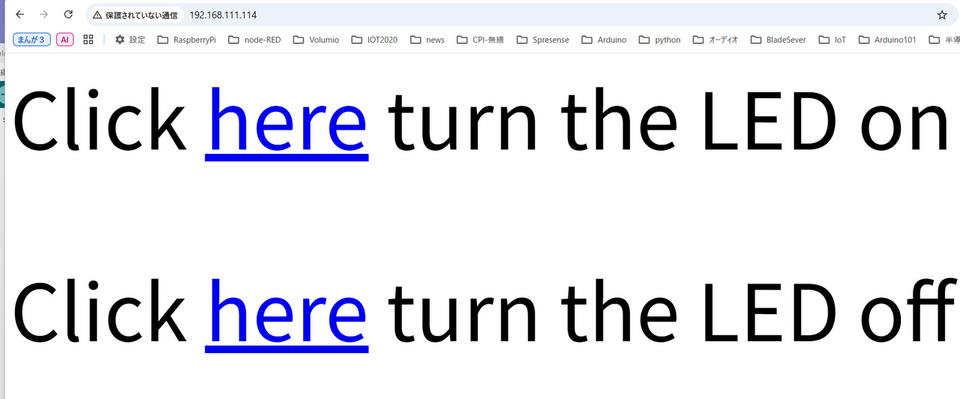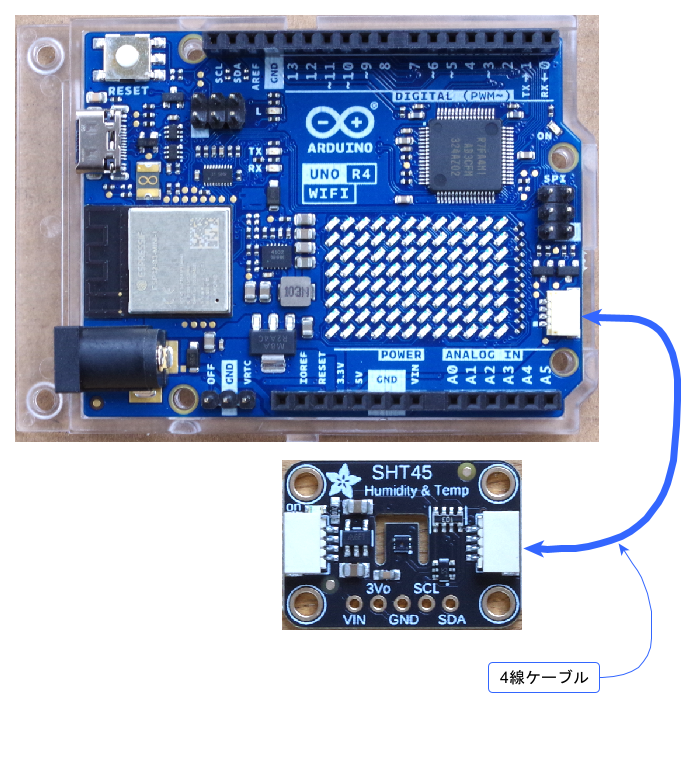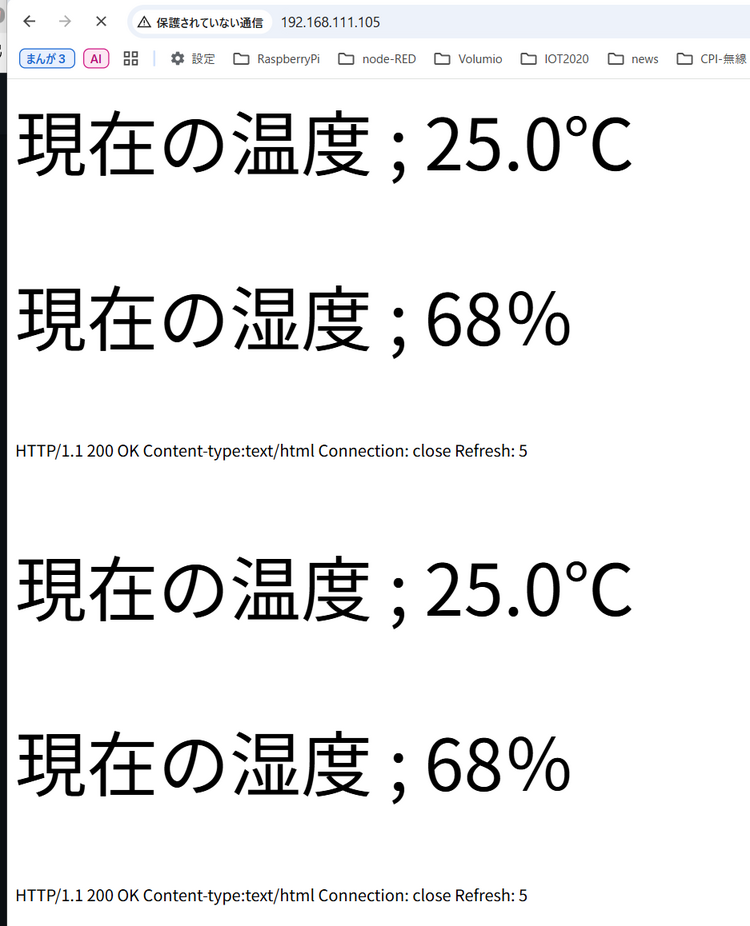今から始める電子工作 Step3 ⑥ Wi-Fi Webserver
このマイコン・ボードのWi-Fiに関するドキュメントは下記のWebページにあります。
サンプルで用意されているSimple Webserverを実行してみます。
●環境
- Arduino IDE;2.3.5
- Windows11;24H2
- Arduino UNO R4 WiFi
●Simple Webserverを実行
Simple Webserver.inoをコピペし、タブで、arduino_secrets.hを新規に作って、記述を追加し、保存します。
実行します。
PCのWebクライアントから、http://192.168.111.114/をアクセスします。
上のhereをクリックすると、D13のLEDが点灯、下のhereをクリックすると、消灯しました。
●温度と湿度を表示
温湿度センサSHT45をI2Cバスにつないで、温度と湿度を測定します。そのデータを上記のスケッチに使います。
SHT45は下記のように配線します。
スケッチです。
下記の簡略的なアクセス方法を利用しています。
今から始める電子工作 ⑱ I2Cバス その2-2 温湿度センサSHT45、Wireライブラリ
#include "WiFiS3.h"
#include "arduino_secrets.h"
///////please enter your sensitive data in the Secret tab/arduino_secrets.h
char ssid[] = SECRET_SSID; // your network SSID (name)
char pass[] = SECRET_PASS; // your network password (use for WPA, or use as key for WEP)
int keyIndex = 0; // your network key index number (needed only for WEP)
int led = LED_BUILTIN;
int status = WL_IDLE_STATUS;
WiFiServer server(80);
// add
#include <Wire.h>
const uint8_t SHT45_address = 0x44;
uint8_t readbuffer[6];
float temperature,humidity;
void setup() {
Serial.begin(9600); // initialize serial communication
pinMode(led, OUTPUT); // set the LED pin mode
// add
Wire1.begin();
// check for the WiFi module:
if (WiFi.status() == WL_NO_MODULE) {
Serial.println("Communication with WiFi module failed!");
// don't continue
while (true);
}
// attempt to connect to WiFi network:
while (status != WL_CONNECTED) {
Serial.print("Attempting to connect to Network named: ");
Serial.println(ssid); // print the network name (SSID);
// Connect to WPA/WPA2 network. Change this line if using open or WEP network:
status = WiFi.begin(ssid, pass);
// wait 10 seconds for connection:
delay(10000);
}
server.begin(); // start the web server on port 80
printWifiStatus(); // you're connected now, so print out the status
}
void loop() {
WiFiClient client = server.available(); // listen for incoming clients
if (client) { // if you get a client,
Serial.println("new client"); // print a message out the serial port
String currentLine = ""; // make a String to hold incoming data from the client
while (client.connected()) { // loop while the client's connected
if (client.available()) { // if there's bytes to read from the client,
char c = client.read(); // read a byte, then
Serial.write(c); // print it out to the serial monitor
if (c == '\n') { // if the byte is a newline character
// if the current line is blank, you got two newline characters in a row.
// that's the end of the client HTTP request, so send a response:
if (currentLine.length() == 0) {
// HTTP headers always start with a response code (e.g. HTTP/1.1 200 OK)
// and a content-type so the client knows what's coming, then a blank line:
client.println("HTTP/1.1 200 OK");
client.println("Content-type:text/html");
client.println("Connection: close"); // the connection will be closed after completion of the response
client.println("Refresh: 5"); // refresh the page automatically every 5 sec
client.println();
// add
client.print("<head> <meta charset='UTF-8'> </head>");
readSHT45();
Serial.println(" temperature= "+String(temperature,1)+"'C");
Serial.println(" RH%= "+String(humidity,0));
client.println("<html>");
client.print("<p {font-family: '游ゴシック';} , style=\"font-size:5vw;\">現在の温度 ; " +String(temperature,1)+ "℃</p>");
client.print("<p {font-family: '游ゴシック';} , style=\"font-size:5vw;\">現在の湿度 ; " +String(humidity,0)+ "%</p>");
client.println("</html>");
delay(3000);
}
}
}
}
}
}
void printWifiStatus() {
// print the SSID of the network you're attached to:
Serial.print("SSID: ");
Serial.println(WiFi.SSID());
// print your board's IP address:
IPAddress ip = WiFi.localIP();
Serial.print("IP Address: ");
Serial.println(ip);
// print the received signal strength:
long rssi = WiFi.RSSI();
Serial.print("signal strength (RSSI):");
Serial.print(rssi);
Serial.println(" dBm");
// print where to go in a browser:
Serial.print("To see this page in action, open a browser to http://");
Serial.println(ip);
}
// add
float readSHT45(){
Wire1.beginTransmission(SHT45_address);
Wire1.write(0xfd);
Wire1.endTransmission();
delay(10);
Wire1.requestFrom(SHT45_address, 6);
readbuffer[0] = Wire1.read();
readbuffer[1] = Wire1.read();
readbuffer[2] = Wire1.read(); // CRC
readbuffer[3] = Wire1.read();
readbuffer[4] = Wire1.read();
readbuffer[5] = Wire1.read(); // CRC
int temp = readbuffer[0] * 256 + readbuffer[1];
int humi = readbuffer[3] * 256 + readbuffer[4];
temperature = -45 + 175 * temp / 65535;
humidity = -6 + 125 * humi / 65535;
return temperature, humidity;
}
実行中の様子です。http://192.168.111.105/




